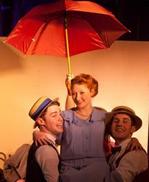SITE GUIDE
SEARCH
REVIEWS
REVIEW ARCHIVES
ADVERTISING AT CURTAINUP
FEATURES
NEWS
Etcetera and
Short Term Listings
LISTINGS
Broadway
Off-Broadway
NYC Restaurants
BOOKS and CDs
OTHER PLACES
Berkshires
London
California
New Jersey
DC
Connecticut
Philadelphia
Elsewhere
QUOTES
TKTS
PLAYWRIGHTS' ALBUMS
LETTERS TO EDITOR
FILM
LINKS
MISCELLANEOUS
Free Updates
Masthead
Writing for Us
A CurtainUp  London Review
London Review
 London Review
London ReviewFlora, The Red Menace
by Sebastian King
|
You are not someone else, someone else is someone else, you are you! — Mr. Weiss
|

Katy Baker as Flora (Photo: David Ovenden) |
It is1935, and Flora Meszaros (Katy Baker), an unemployed fashion illustrator, lives in an apartment full of artists and creatives (think Rent but with less drugs and more tap dancing). On the same day that she lands a top job working for top department store Garret & Mellick’s, she meets Harry (Steven Sparling) a painter. The pair hit it off immediately, and it isn’t long before Harry is trying to convert Flora to Communism. When she attends a Communist Party meeting, she finds a love rival in the form of the predatory Comrade Charlotte (Ellen Verenieks), and as her job, relationship and commitment to the party develop, she finds her loyalties tested to the limit.
The role of Flora, played in the original Broadway production by Liza Minnelli, is the beating heart of this show. In her, Kander and Ebb (along with book writers George Abbott and Robert Russell) have created a prototype for Sally Bowles, although the character also has shades of Charity Hope Valentine and even Mama Rose.
Katy Baker delivers a knock-out performance, brassy and ballsy one minute and heartbreakingly vulnerable the next. Her husky voice is the perfect match for some big belty ballads, and she mines every possible witticism from the text. Unfortunately, Baker’s strength reveals weaknesses elsewhere, and we yearn for her return whenever she is offstage.
That being said, there is strong support in the form of Ellen Verenieks as Flora’s nemesis, a quirky femme fatale who looks and acts like a cross between Carol Channing and Kathy Griffin. Comrade Charlotte’s rallying cry "The Flame" is the most recognisably Kander and Ebb number, partnered with Kate McPhee’s choreographic homage to Bob Fosse. In the programme notes, director Randy Smartnick talks of having a "massive vision" for the production, but his design and staging feel a little rough around the edges, and his somewhat misguided attempt to create a "light-hearted and fluffy" production with ‘a little Broadway cheese’ smacks of missed opportunity to explore the darker elements of the plot.
At a time when unemployment is at an all-time low and artists are fighting for what precious jobs there are, there are clearly relevancies in this revival. Some of the songs are hidden gems that pack a real punch, but despite the best efforts of the cast and creative team, the score is neither as likeable, nor as memorable as the Kander and Ebb classics, and the book fails to provide any real insight into the Communism movement. Nevertheless, this production does have its merits — not least providing a showcase for the brilliant Katy Baker—- and certainly puts forward a valiant case to save the show from obscurity.
| Flora, The Red Menace
Music by John Kander Lyrics by Fred Ebb Book by George Abbott and Robert Russell, revised by David Thompson Directed by Randy Smartnick Starring: Katy Baker, Ellen Verenieks, Carly Mackelvie, Steven Sparling With: Kimberley Moses, Simon Ouldred, Greg Sheffield, Scott Slaytor, Joe Shefer Set Design: Randy Smartnick Costume Design: Kate McPhee Lighting: Sky Bembury Musical Direction: Aaron Clingham Choreography: Kate McPhee Running time: 2 hours 30 minutes including interval Box Office: 020 7737 7276 Booking to 14th July 2012 Reviewed by Sebastian King based on 3rd July performance at The Landor Theatre, 70 Landor Road, London, SW9 9PH (Tube: Clapham North)
| ||
|
REVIEW FEEDBACK Highlight one of the responses below and click "copy" or"CTRL+C"
Paste the highlighted text into the subject line (CTRL+ V): Feel free to add detailed comments in the body of the email . . . also the names and emails of any friends to whom you'd like us to forward a copy of this review. |




